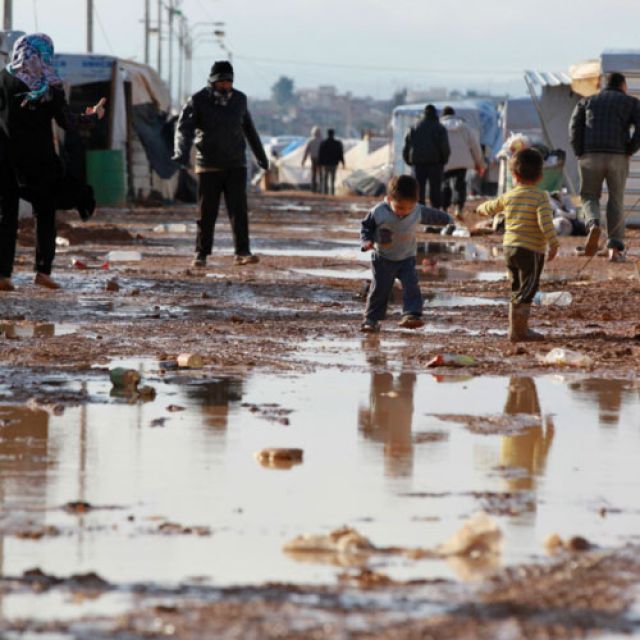Aid workers in Jordan, Turkey and Lebanon say they are stretched to the limit because they need additional funds to provide food supplies and other basic necessities to the refugees in such freezing weather. The United Nations said Jan. 11 that the new enemy for about 600,000 Syrian refugees who escaped to these countries is the bitter winter.
Omar Abawi heads the emergency response unit for Syrian refugees in Jordan for Caritas, the Catholic Church's humanitarian nongovernmental aid agency. He said the group has concentrated its efforts in Jordan on Syrian refugees sheltering in towns along the northern border with Syria and those in the capital, Amman, where the majority of an estimated 300,000 Syrians in Jordan live.
The U.N. and a Jordanian relief agency handle about 50,000 of that number who sheltering in the nearby Zaatari camp.
"We are reaching out to help Christians, Muslims and the minority Alawites," Abawi said of the Syrians who share the apartments -- normally three families in each apartment in frontier towns such as Mafraq, Irbid and Ramtha.
A typical Syrian family has between five and 10 people. The usual arrangement is for each family to live in one room. The apartment furnishings are spartan, perhaps a small rug and some cushions or mattresses on the floor for sitting and sleeping. The families share the common bathroom. Most refugees cross the border with just the clothes on their backs.
In December, Caritas launched a winterization campaign with funding from Denmark, Germany and other European countries to provide 5,000 Syrian families with blankets, heaters and kerosene vouchers for the heaters.
Abawi said that while the group anticipated the possibility of extreme weather as experienced the week of Jan. 7, when a rare foot of snow was dumped on Jordan, "heating has been a priority," both in the provision of space heaters -- central heating is rare in the Middle East -- as well as water heaters.
He said an appeal launched over the past year called for $1.7 million to also cover medical needs, food and nonfood items.
But the list of other needs the refugees have is long. Through home visits, Caritas sees what kind of specialized assistance each family requires. Abawi said the agency helps with home maintenance, provides warm clothing and shoes and assists with "catch-up classes" for children who missed out on schooling in Syria due to the violence.
Although Jordan has opened its schools to Syrian children, Abawi said that not all Syrian families allow their children to attend. Schools are overcrowded and are forced to hold two shifts. He said some Syrians are afraid for their children entering a different education system, while others want the children to earn money by selling cigarettes or cellphone credit on the street.
"Paying rent is a major problem for the refugees," Abawi said. Caritas also tries to help the refugees locate income-earning opportunities and, in some instances, makes small financial contributions to the families to secure their situations.
Meanwhile, Jordan TV reported that 70 Syrian refugee families were evacuated following the flooding of their tents at the Zaatari camp after the unusual weather.
On Jan. 8, some refugees rioted when three days of heavy rain engulfed dozens of the flimsy tents and wind tore down others. Small ponds formed in low-lying areas of the desert facility, where the sand that has a consistency of talcum powder does not easily absorb water.
Seven aid workers with a Jordanian charity helping to manage the camp were injured in the melee. The refugees complained that they had to find their own alternate accommodation in the camp, most often sharing a cramped tent with another family.
"If we are suffering from the cold, then what about our young children," asked a 37-year-old man who identified himself as Mahmoud. Zaatari is known as the "children's camp"; most of its residents are children and their mothers.
A number of the refugees, who rarely provide their full names out of fear of reprisal against relatives who remain in Syria, complained that their children were "suffering from acute diarrhea, vomiting, and fever." One named Ali said the camp's ambulance had to pick up his "two toddler nieces who were suffering from hypothermia for treatment in the field hospital."
In the eastern Lebanese town of al-Faour, Syrian refugees also had tents flooded from rain. Two Syrian refugee encampments in Lebanon's eastern were completely immersed in water after the Litani River burst its banks and the water came pouring into their tents.
Authorities there said dozens of Syrian refugees were forced to leave in search for alternative shelter. Lebanon says there are about a half million Syrian refugees in the country.
The Turkish government said 150,000 Syrian refugees housed in camps there, but church officials said tens of thousands of others are not in camps, and thus not getting government aid. The country has been providing food, tents, warm clothes and blankets, and medical care to refugees in the camps.


